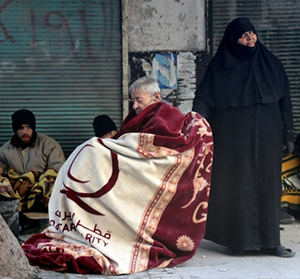Aleppo, Dec 18: Desperation mounted today among thousands of hunger-stricken Syrian civilians trapped in the rebel enclave in Aleppo after their evacuation was delayed by a disagreement over the fate of other besieged areas.
As international alarm grew over the plight of residents including women, children, the sick and wounded, the UN Security Council was to vote on whether to send observers to the battleground city.
An AFP correspondent who visited a hospital in the rebel sector saw appalling conditions with patients lying on the floor without food or water and almost no heating despite sub-zero temperatures at night.
Thousands of civilians and rebels had begun leaving Aleppo on Thursday under an evacuation deal allowing Syria's regime to take full control of the divided city after years of fighting.
But the operation was suspended the next day with both sides blaming each other.
The main obstacle to a resumption is a rift over the number of people to be evacuated in parallel from two Shiite villages, Fuaa and Kafraya, under rebel siege in northwestern Syria.
Under an agreement reached between Turkey, which backs the rebels, and regime allies Russia and Iran, those evacuations would take place at the same time as the Aleppo operation.
But differences remain over the number of people to leave the villages -- the rebels have agreed to 1,500 while Shiite Iran wants 4,000 people to be allowed out.
Al-Farook Abu Bakr, of the hardline Islamist rebel group Ahrar al-Sham, said a deal had been reached for the evacuations to resume and it was possible that they would happen today.
The UN Security Council was set to meet at 1600 GMT in New York to vote on French proposals to dispatch monitors to oversee evacuations and report on the protection of civilians.
The draft text said the council was "alarmed" by the worsening humanitarian crisis in Aleppo and by the fact that "tens of thousands of besieged Aleppo inhabitants" are in need of aid and evacuation.
"Our goal through this resolution is to avoid another Srebrenica in this phase immediately following the military operations," French Ambassador Francois Delattre told AFP, referring to a 1995 Bosnian war massacre.
But the proposals face resistance from veto-wielding Russia, a key backer of Syrian President Bashar al-Assad.
Families have been sheltering during the night in freezing temperatures in bombed out apartment blocks in Aleppo's Al-Amiriyah district, the departure point for evacuations before they were halted.







Comments
zwgmhum
http://www.lanarkunitedfc.co.uk/961-nike-air-max-90-jacquard-red
http://www.bencookartist.co.uk/air-force-2016-606.html
http://www.cars-wrapping.co.uk/004-nike-free-flyknit-chukka-on-feet.html
http://www.lanarkunitedfc.co.uk/724-nike-air-max-90-hyperfuse-2013
http://www.bike-courier.co.uk/air-force-nike-2016-786.html
Adidas Cap Stripes
Adidas Yeezy Boost Foot Locker Uk
Nike Air Max 90 Ultra Essential Women's
Nike Air Max 1 Ultra Moire Black/Black
Mens Nike Shox Turbo
Add new comment